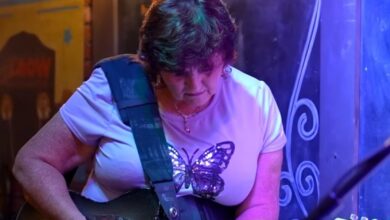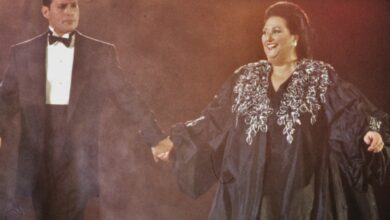Heart’s deeply moving and powerful take on “Stairway to Heaven” received immense praise from audiences everywhere
In 2012, during the Kennedy Center Honors, Heart took on the monumental task of performing “Stairway to Heaven,” and their interpretation reshaped what a tribute could represent. It was not merely a respectful nod to Led Zeppelin’s legacy. It became a moment where admiration and artistic courage intertwined, creating a performance that felt both emotionally raw and beautifully elevated. Ann and Nancy Wilson guided the arrangement with confidence and soul, proving that honoring music history can still involve bold creativity that reaches beyond simple imitation.
Nancy Wilson initiated the piece with a calm yet intense acoustic guitar introduction that echoed familiarity while offering a renewed sense of wonder. The gentle picking of those famous notes instantly placed the entire venue in a state of deep anticipation. The crowd sat completely focused, understanding how rare it is to witness an interpretation that feels nearly as iconic as the original. When Ann Wilson’s voice entered, it rolled through the hall with a stirring blend of vulnerability and power that set the emotional tone for what was coming.
As the performance expanded, the music grew fuller and richer, taking on a spiritual radiance. A gospel choir dressed in black appeared behind the band, their voices adding another dimension that transformed the song’s mysticism into something reverent and uplifting. Their harmonies supported the core melody without overwhelming it, offering a sense of ascension that made the lyrics feel like a journey from earth to something far beyond. This was an interpretation that dared to explore new emotional spaces while staying rooted in the original’s spirit.
When Jason Bonham stepped behind the drum kit, the atmosphere shifted. Everyone in the room understood the emotional significance of John Bonham’s son carrying the rhythm his father once powered with unmatched force. His first kicks and snare hits were like echoes of rock history returning to the forefront, but he avoided strict replication. Instead, he delivered a performance filled with heartfelt energy that honored his father while showcasing his own artistry. That connection between past and present deepened the emotional resonance for everyone watching.
Seated in the audience, Robert Plant, Jimmy Page, and John Paul Jones watched the performance unfold with increasing emotion. The spotlight frequently captured Plant’s expressions shifting from composure to visible tears. For years, he had carried a complicated relationship with this song, often distancing himself from its overwhelming popularity. Yet in that moment, witnessing Heart reimagine it with such affection and gravity, he seemed to truly receive the emotional message that listeners had always felt through “Stairway to Heaven.”
Every instrument seemed to serve a narrative purpose as the song continued building toward its climax. The interplay between strings, brass, and percussion created an atmosphere that felt cinematic, while Ann Wilson’s vocals climbed higher with each line. The arrangement did not rely on nostalgia. It pushed forward, reminding the audience that great music is a living thing that can grow and evolve. The choir’s harmonies grew stronger, and the stage lights brightened, signaling that an unforgettable peak was moments away.
The emotional impact intensified as Jason Bonham’s drumming thundered across the venue, enhancing the drama with every strike. The choir rose to meet that power, and Ann reached a vocal height that seemed to shake the walls. What began as a recognizable classic transformed into a vibrant celebration of artistic passion. The performance felt like it brought the original song back to life in a completely fresh way, capturing both its mystery and its beauty while expanding its meaning for a new audience.
It became clear that the intention was not to overshadow Led Zeppelin, but to spotlight them with the deepest respect possible. Page nodded along with a proud rhythm in his expression, Jones watched with a quiet joy, and Plant mouthed words of awe as he reacted to the song’s emotional weight. In those moments, the performers and original creators shared an unspoken acknowledgment of how timeless and transformative music can be when delivered with sincerity and heart.
Later, Plant shared that he did not fully grasp the depth the song carried for others until witnessing this tribute. Hearing that from the original voice behind one of rock’s most celebrated compositions revealed the significance of Heart’s choices. The arrangement had uncovered new emotional layers and reconnected the music to its audience in a way that felt fresh despite the song’s long legacy. It was a reminder that meaning can evolve when someone brave enough guides it forward.
The response that filled the hall when the performance concluded was not simply applause. It was a powerful surge of appreciation. Audience members rose from their seats immediately, clapping and cheering with visible admiration. Tears were common, and even those who had doubted that the song could ever be respectfully reinterpreted found themselves moved. For many people sitting there, and countless others who later watched online, this felt like witnessing a once-in-a-generation musical tribute.
Heart had long been respected as a powerhouse in rock history, yet this particular moment elevated their legacy even further. They demonstrated that paying homage does not require copying every detail. The true tribute lies in honoring intention while transforming it with emotional truth. Their ability to connect their artistry to Led Zeppelin’s profound legacy showcased why they deserved a place among the most impactful performers of their time.
For Led Zeppelin, the tribute served as a heartfelt acknowledgment of what their music continues to mean to millions around the world. Watching others embrace their creation with reverence and renewed imagination offered a sense of completion, like witnessing a reflection of their own story told through a different lens. It was a gentle closing of a loop that had started decades earlier when “Stairway to Heaven” first reached listeners’ hearts.
Years later, the emotional power of that night remains undeniable. Fans continue to return to the performance, allowing it to move them again and again. Musicians still study it as an example of how to honor the past while creating something new and unforgettable. In the end, Heart’s rendition helped the song achieve what its title had always suggested. Instead of simply echoing across generations, “Stairway to Heaven” rose once more into something transcendent, finding new wings in front of an audience ready to ascend with it.





